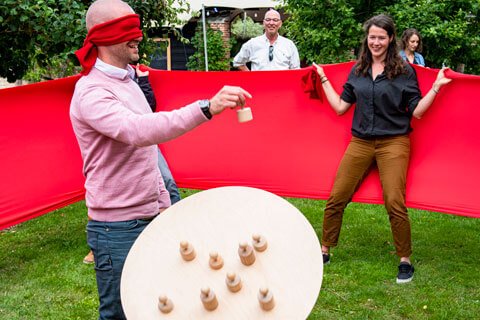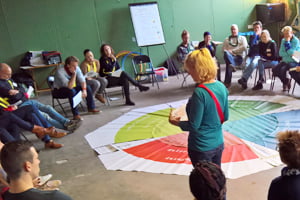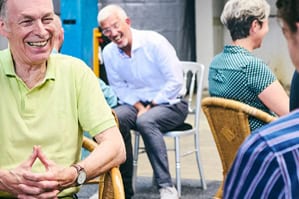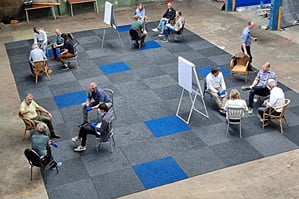Stronger together:
team coaching for growth and connection
Every team has moments when things just don't go their way -
communication falters,
goals remain unclear, or
Working together takes more energy than necessary.
Team coaching helps teams regain momentum, become stronger and make use of everyone's qualities.
At Team4Teams, we believe that sustainable growth starts with awareness and trust.
Slow down, to speed up.
Together with an experienced team coach, you explore what is going on,
Where you want to go,
And how you can get there as a team.
These team coaching programmes
support practical and flexible:
Team building
communication styles
feedback
Supporting cooperation
Scale of Cooperation
Systemic work in teams
Team in dire straits
Our team coaching programmes
Regular part of a trajectory
a focus
in team coaching
At the same time, a tip of the hat: 'How do you guide so that feedback becomes learning and useful (again)?'
This starts with understanding that not every feedback is received in the same way:
In team coaching, we distinguish between
criticism, a hint and feedback.
To do so, we use the Scale of Collaboration as a roadmap.
Distinction between criticism, a hint and feedback
gives insight,
requires translation to one's own team and recognition,
with the recognition that in a collaboration, everyone participates.
And contributes to experiencing growth (again)
as soon as a topic is taken up.

Criticism?
Sometimes feedback is received as criticism. Those who get irritated, wait too long or are caught off guard give feedback in a way that makes it harder for the other person to receive it with a learning attitude. Someone gave feedback, the other person clammed up, fled, feigned or got defensive.
We then call the feedback criticism.
This is not about 'right or wrong': criticism produces a different effect.
Irritation contributes to taking feedback personally. In case someone addressing someone becomes personal, chances are that the person addressed will want to defend themselves. What could have become a learning process becomes something else: stagnation, denial, or a discussion.
Is giving criticism commonplace in an organisation? Then the team easily gets into resistance and shared goals get out of sight. Sometimes above ground, more often below ground. This puts psychological safety under pressure. In a team which (under)goes this route, a strong need arises to 'blame' someone for all this. The victim then gets a coach.
More often than desired, this eventually leads to a rift.
Team4Teams starts with the team, together with the managers. A process in which the pressure is too high, we start with individual interviews, looking for passable paths beyond the blockages.
A hint?
Most 'feedback' is not feedback but a noncommittal hint.
Usually quick and in between, without conversation about the reason and agreements on who will do what.
By keeping it 'vague', no one is addressed and thus each retains space for themselves. The need for freedom then wins out over the need for closer cooperation.
"We need to work better together!".
Everyone agrees, but no one shares what triggers it, or bothers them. Maybe someone takes the initiative, the initiative is supported, 'we are going to do something', but more often it still sticks somewhere... Too expensive, no time.
We then call it a hint...
Dodging the conversation also produces effects.
Team members become more distant from each other.
Until the bomb bursts, things stagnate or... cooperation is picked up.
Feedback?
For us, feedback is only feedback when it is clear where you want to go together and you grant each other something. As soon as you give feedback from an attitude of favour and with a clear shared goal, the other person can receive it learning and that's how you learn together of mistakes made.
Of course, feedback techniques from a course can also support.
Besides, a collaborative setting where you want to pull together with each other, creating a socially safe environment, makes all the difference.
We use The Scale of Cooperation as a roadmap.
The Scale of Cooperation
a roadmap in team coaching





